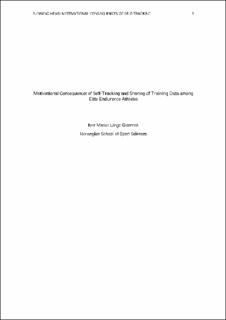Motivational Consequences of Self-Tracking and Sharing of Training Data among Elite Endurance Athletes
Master thesis
Permanent lenke
https://hdl.handle.net/11250/3050329Utgivelsesdato
2022Metadata
Vis full innførselSamlinger
Sammendrag
In the current study, we investigated how self-tracking with modern sports watches and sharing of training data via the social network Strava psychologically influences Norwegian elite middle- and long-distance runners and whether this can have implications for their training. We used a qualitative design, including semi-structured interviews, interviewing nine athletes between 19-29 years of age who all were qualified for the Norwegian Championship in athletics. Five of them were men, and four were women. Data were analyzed using Braun and Clarke's (2022) reflexive thematic analysis. Results were discussed in light of the Self-determination theory (SDT; Ryan and Deci, 2000). Our findings suggest that self-tracking gives athletes more feedback on how well they are performing in their training, consequently affecting their motivation based on positive or negative perceptions of their performance. Furthermore, self-tracking allows athletes to see how well they perform their training in relation to specific standards regarding pace, distance, and duration. These standards can have implications for the choices they make in training. Sharing training data on the social network Strava can be fun and inspiring, but it can also induce a controlling factor that makes it harder to adjust the training if needed. Athletes are sometimes aware that there can be both positive and negative consequences of self-tracking and sharing of training data and therefore have reported strategies for avoiding the adverse effects.
Lay summary: In the current study, we investigated how self-tracking and sharing of training data on social media can influence Norwegian elite middle- and long-distance runners' motivation and subsequent training.
Beskrivelse
Masteroppgave - Norges idrettshøgskole, 2022
